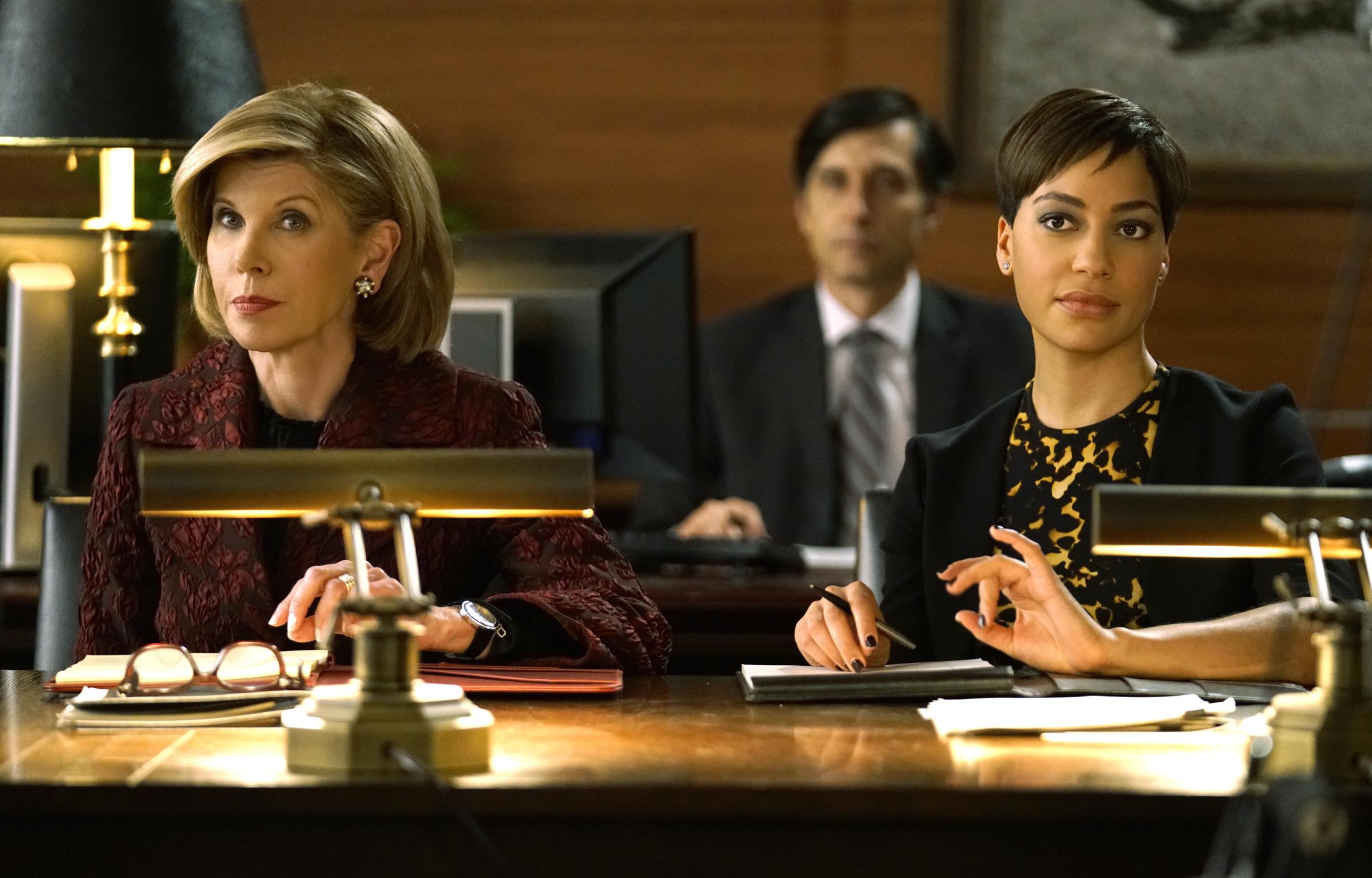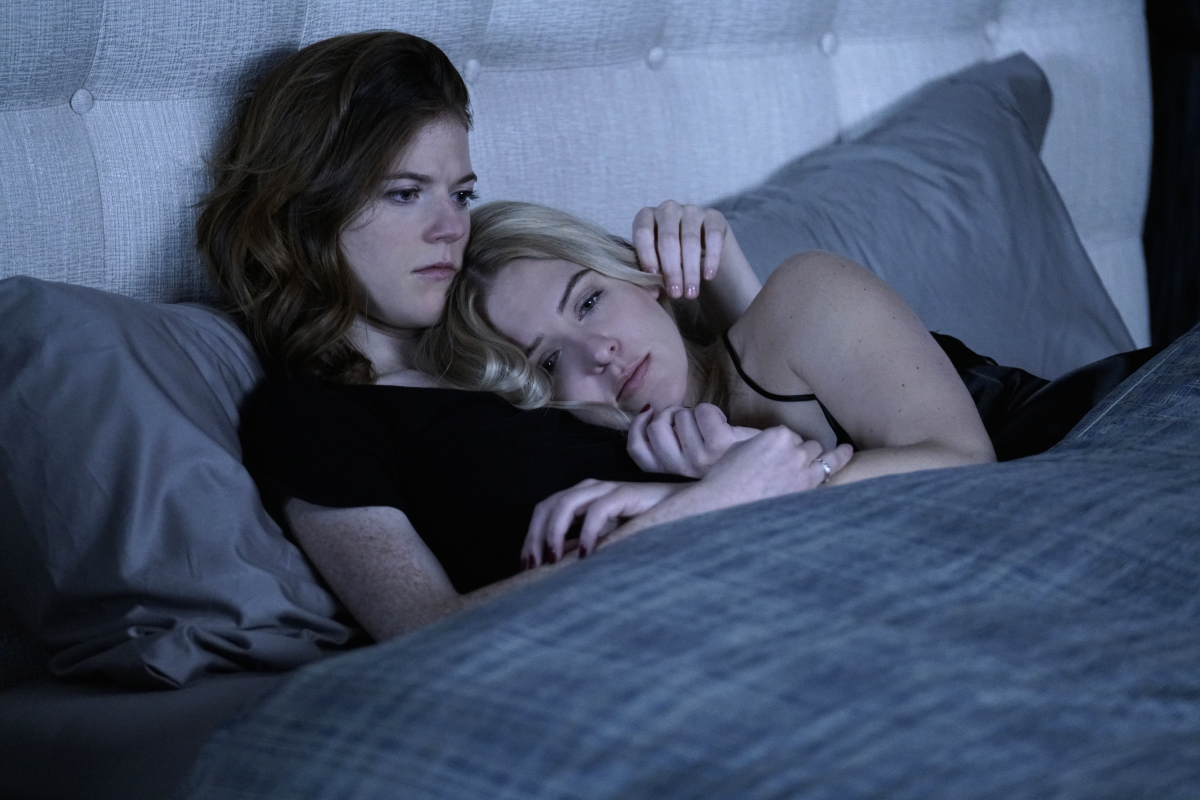In one of the first scenes Christine Baranski filmed for The Good Wife spinoff, The Good Fight, her character Diane packs away a picture of herself and Hillary Clinton. The photoshopped prop that sat on the high-powered lawyer’s desk for seven seasons was moving to storage now that Clinton was president and Diane was retiring.
That shot, which was filmed the night before the election, will never air. Donald Trump’s surprising win meant the show’s creators Robert and Michelle King had to frantically rewrite not just the scene, but the entire series. “We threw out all the episodes we were going to do and started over again,” says Robert. Originally, Diane decided to retire because Clinton had “broken the last glass ceiling.” Her new motivation: escaping a Trump administration.
“The Good Wife tried to react to the culture around it,” says Robert. “Three months after the Snowden revelations, we had a show about that. We knew when Trump was elected The Good Fight would become much more about the alt-right, fake news, how a radically conservative president would drive the left crazy.”
MORE Everything That Happened on the Good Wife Finale
Now, the revamped pilot, which will air on CBS Sunday and move to CBS’ new streaming service CBS All Access thereafter, begins with a dumbfounded Diane watching Trump’s inauguration. She decides to relocate to Provence, France—the liberal millionaire’s version of moving to Canada—only to find out she has lost all her money in a Ponzi scheme. Worse, her reputation is tarnished because she recommended that friends and women’s organizations also invest their money with the same Bernie Madoff type. Disgraced and broke—not unlike Alicia Florrick (Julianna Margulies) at the beginning of The Good Wife—Diane desperately searches for a firm that will take her in.
“The pilot is about a woman in free fall,” says Baranski. “She cannot believe what has happened in the election, what happened to her. Curiously, I think that’s people’s psychology right now. We’re in a collective free fall with this new administration. Nobody knows on a daily basis what’s going to happen. America’s foundations have been rocked.”
The show’s name has new resonance, too. The Kings say The Good Fight was originally chosen “for cynical reasons”—marketing the spinoff. “But once Trump was elected, it took on a new meaning for the show and the characters in the show,” says Robert. “With the recent travel ban, we saw lawyers as heroes. Everyone was cheering them as they entered in airports.”
At a time when the criminal justice system is in the spotlight, often because of the president’s actions, the three female stars of The Good Fight battle for justice with a renewed urgency. Diane is joined by two other main characters: Maia, a new lawyer and the daughter of the Madoff figure (Game of Thrones’ Rose Leslie) and Lucca (Cush Jumbo), Alicia’s law partner from The Good Wife who butted heads with Diane.

That’s not to say that The Good Fight lands strictly in the liberal camp. The Good Wife mined real news to present arguments for both the left and the right, as when liberal Diane agreed to help a conservative think tank in a mock trial about whether a devout Christian baker should have to make a wedding cake for a gay couple. Though Diane sided with the gay couple—and won—the script volleyed convincingly between liberal and conservative arguments.
The Good Fight‘s eight writers come from across the political spectrum. The Kings say each morning usually begins with the staff debating the news, conversations that wind up in the show’s scripts. “I think a lot of the actors have found it quite cathartic, maybe more cathartic than if we were playing a waitress in a diner or something,” says Jumbo. “You talk about it, you get it out of your system.”
One of the early episodes introduces a character based on Milo Yiannopoulos, a notorious internet troll and a former editor of alt-right news site Breitbart. “There’s the obvious satire of his character,” says Robert. “But there’s also the question of what should these social media companies do. Should they censor? And are they censoring the right more than the left? The idea is to find the right set of circumstances to push our writers to say, ‘I don’t necessarily fall on the side I usually fall on.’”
Baranski says the show provides a civil conversation that we need more than ever in a world where each political faction seems to be conversing within their bubble or yelling past their opponents. “We’re as devoted to trying to find the intelligence on every side of an argument as we have ever been,” adds Michelle.
Still, not everything has changed. Baranski points out that the question at the core of The Good Wife—why a woman would stand beside her misbehaving husband—is still relevant. “Look at Melania Trump. You could say we have another ‘good wife’ in the White House,” Baranski argues. “She says, ‘Well, it was just guy talk,’ when he says something awful about women. She’s supposed to stand and wave and smile. As long as she tolerates his behavior, we’re supposed to tolerate it.”

The Kings had always planned to venture into new territory. The television landscape has changed significantly since The Good Wife premiered eight years ago, with more platforms for different types of television to air. Airing on CBS All Access, for example, frees Diane up to drop an F-bomb or two.
The Good Wife was lauded for its nuanced portrayal of women in power, but The Good Fight aims to take on issues of race and sexual orientation as well. Diane and Maia join Lucca’s primarily black law firm, where they work on police brutality lawsuits. “There’s actually nothing more boring than sitting down and watching a ‘show about race,'” says Jumbo. “In the best dramas those things are tackled within the story in a way that’s interesting and you forget that they’re happening. On paper, yes, they work at a majority African-American firm. But the more you get into the story, you stop thinking about who you’re seeing onscreen. It’s just a firm.”
Meanwhile, Maia has a longtime girlfriend at a time when gay characters tend to be treated by their writers as disposable plot points. The Kings say it’s unlikely a network would have greenlit a show with a gay character as a lead—and three women as the stars—when The Good Wife premiered eight years ago.
The three women, though often at odds, manifest a more optimistic view of female friendship than ever made its way onto The Good Wife. In that show, when Alicia suffered, she suffered alone. On The Good Fight, when Maia runs into a women’s bathroom to escape an enraged investor, Lucca follows her to offer help: “I had a friend, went through the same thing, said it was hell for a few months. Harden yourself.”
The last shot of the pilot shows Christine extending her hand to Maia so they can move to the new law firm together. “It’s the older woman mentoring the younger woman and saying, ‘It’s not over,’ and taking her hand and walking off with her,” says Baranski. “To me, it reflects what women are going through right now. ‘Oh my God, are we really going to have to fight for reproductive rights? Is it still not over?’ We still have to fight the good fight.”
More Must-Reads from TIME
- Cybersecurity Experts Are Sounding the Alarm on DOGE
- Meet the 2025 Women of the Year
- The Harsh Truth About Disability Inclusion
- Why Do More Young Adults Have Cancer?
- Colman Domingo Leads With Radical Love
- How to Get Better at Doing Things Alone
- Michelle Zauner Stares Down the Darkness
Write to Eliana Dockterman at eliana.dockterman@time.com